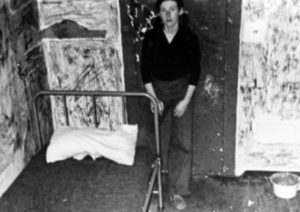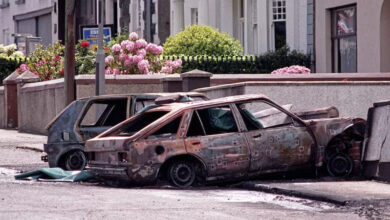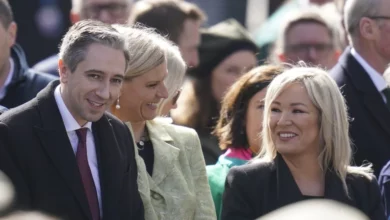Hunger Strike 1981 visto dalla prigione femminile di Armagh
The 1981 hunger strike from inside Armagh jail

The period of the hunger strikes left many enduring images but for one former prisoner from Derry, the sight of the sisters of Thomas McElwee carrying his coffin from his south Derry home is one she will never forget. Marie Doherty watched one of the most turbulent periods of recent Irish history, the hunger strikes, from both inside and outside prison.
Arrested in 1977, she served several years in Armagh women’s prison, where she took part in the prison protest during the first hunger strike, before being released in 1981, shortly before start of the second hunger strike, during which ten republicans died.
Marie went into prison as the protest by republican prisoners was escalating. “I was arrested in February 1977 and when I went into jail the political status had gone at that stage,” she said.
The former prisoner said she soon got an introduction to the brutality of the prison regime. “About six months after I was sentenced a shout went up one evening that there was chicken for dinner which was unusual because we never had chicken on a Tuesday. We all rushed down to the canteen and while we were there the screws moveds in and penned us in and others went to search the cells. A riot broke out and we were all locked up for three days continuously with no access to toilet or washing facilities. That was the start of the no wash protest.
“We were moved to A wing and many prisoners got beaten during the move. It was male screws who moved us and they were the one doing the beating. That is how it started,” she said.
Marie was to spend the next 14 months in A wing, including the period of the first hunger strike in 1980. “We had no access to radios but we had comms coming in and Fr Murray played a major role in bringing news into us. He was coming in two or three times a day at one point,” she explained.
The Derry woman said that when the first hunger strike began in December 1980 the women in Armagh knew the seriousness of the situation. “There was a very sombre mood in Armagh. Everybody acknowledged that when the hunger strike came about the possibility was there that someone was going to die. No one knew that there was going to be so many. We were in full support of the prisoners and we knew that we were all together,” she said.
Marie said the beginning of the hunger strike changed everything for the prisoners in Armagh. “Before that there were sing songs at night, storytelling, and people were learning Irish. That all stopped. There was a seriousness about the situation. Everyday we waited for news.
“We were locked up for 23 hours a day. It was quite a still sort of time. It was like we were in limbo. We wanted to know what was happening and we were waiting on news. Everybody was hoping.
“Everything centred around the hunger strike. We worked it so there was a visit coming into the wing every day so that news would be brought in. We got the news through Mairead Farell, our OC.
“We were allowed one letter a week and my father always wrote to me. He wouldn’t let anyone else write to me and he packed as much news as he could into that letter,” she said.
When the first hunger strike ended in December 1980, Marie said there was relief in Armagh that no-one had died but added that it was a short lived relief. “When it ended we started looking forward to Christmas and were relieved that no one lost their lives but it was so short lived. We realised very quickly that the prisoners’ demands would not be met and that the British had reneged on their committments.
“Within a day or two of the ending of the first hunger strike that there would have to be another one,” she said.
Marie explained that republican prisoners in Armagh had close links with the men in Long Kesh. “There wasn’t a woman in Armagh who wasn’t writing to at least one man in Long Kesh. I shared a cell with the fiancee of Tom McElwee for three years and it was awful watching her, knowing that he was going on hunger strike. We knew the first four who were going on and she knew at that stage that Tom’s name was on the list. For her it was not just being separated from him but she also knew what he was going through in Long Kesh.
“I remember the night before I got out in February 1981, just before the hunger strike started in March. They had a sing song for me because I was getting out and I remember sitting in the cell with her and talking and we just cried,” she said.
Marie was released just before the hunger strike began and threw herself into the campaign in support of the prisoners. “I remember hearing the news that Bobby Sands had died and I went up to Belfast for the funerals. After the funeral I wrote to my cell mate about the huge crowds and telling her that Thatcher could not ignore the will of the people,” she explained.
As the summer of 1981 continued, nine more hunger strikers died in Long Kesh and Marie, like many Derry republicans, travelled to their funerals. “I remember going to the funerals after they died. The thing that sticks out most in my mind was the funeral of Tom McElwee. I remember seeing his seven sisters carrying his coffin. That was the first time I had ever seen women carrying a coffin, it just wasn’t done back then. That sticks out in my mind. It was his sisters telling the world that they were proud of their brother and what he had done. When I think of Tom McElwee that is what I think of,” Marie said.
The Derry woman also said there was a sense of anger following the deaths of the ten hunger strikers. “When the hunger strike ended there was a real sense of anger. I was brought up not to use the word hate but I really hated Thatcher. The anger was not just directed against the British government but at all who had let them die,” she said.
Marie has not spoken publicly about the hunger strike since 1980 but will be addressing a commemoration on October 3rd organised by the ‘81 Committee to mark the end of the protest. “When Bobby Sands went on hunger strike he had a vision. It was a new phase in the struggle. The situation is we have now came out of that vision and is simply a different phase in the same struggle,” she said.




